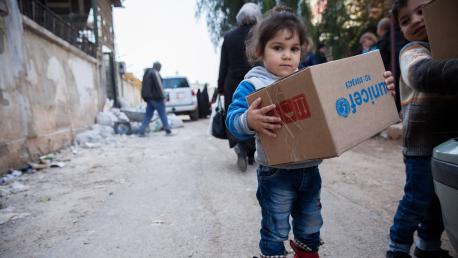
UNICEF in Syria
Far too many children and families in Syria continue to be impacted by a humanitarian crisis that has no end in sight. UNICEF is there, working with partners to meet urgent needs.
Syria in crisis
UNICEF's ongoing response to the February 2023 earthquakes that struck both Syria and Türkiye (Turkey), killing tens of thousands of people and displacing millions more, is an extension of UNICEF's longstanding humanitarian and emergency operations in the country.
Children in Syria have been living under the constant threat of violence, deprivation and extreme emotional duress since the start of Syria's civil war in 2011. Many homes, schools, hospitals and water treatment facilities in Syria had already been destroyed, and millions of children and families had been uprooted by fighting. Families were already struggling — and continue to struggle — to afford food and other basics.
Millions of Syria's children have been living as refugees in Egypt, Iraq, Jordan, Lebanon and Türkiye for years. For those who remain inside the country, displacement has become a way of life.
The socio-economic impacts of the COVID-19 pandemic hit children and families extremely hard, further eroding access to essential services.
More than half the population — over 11 million people, including 6.1 million children — require humanitarian assistance. The scale, severity and complexity of their needs are extensive.
How UNICEF is helping children in Syria
UNICEF remains on the ground in Syria, collaborating with partners to provide a range of support and protection services and meet urgent needs, particularly in areas still recovering from the 2023 earthquakes.
Ongoing programs and interventions in Syria seek to:
- improve access to safe drinking water and sanitation services
- provide mental health and psychosocial support
- help out-of-school children get back to learning
- strengthen lifesaving and preventative nutrition services, including treatment for acute malnutrition and safe and appropriate infant and young child feeding practices
- vaccinate children against measles and polio and other preventable diseases, including those living in hard-to-reach areas through mobile teams
- strengthen infection prevention and control at the community level
- distribute hygiene kits and promoting safe hygiene practices
- provide specialized services for survivors of violence, exploitation and abuse
- expand social protection for the poorest families through cash transfers
- expand life-skills programs, vocational education and entrepreneurship training for adolescents and young people
Having grown up amid violence, displacement and loss in rural Aleppo, Kinda, 7, below, far left, and her siblings are picking up the pieces of their lives — catching up on their learning at a UNICEF-supported school, receiving psychosocial support and getting educated about the dangers of land mines:
Support children in need. 100 percent of your gift is tax-deductible.